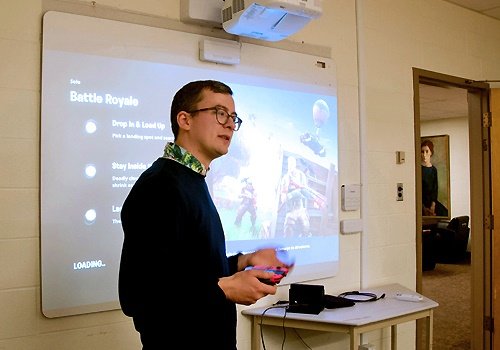A small group of first-year students in the Faculty of Arts & Science is learning more about what academic work means — and just what kind of place a university really is.
For the 30 undergraduates taking Felan Parker’s First-Year Foundations seminar How to Study Video Games, the course is more than just an introduction to the relatively new field of digital game studies. It’s also an opportunity for students to forge meaningful relationships with each other and their instructor — while getting to know the wider world of the University.
How to study video games
“I try not to downplay the fact that a course on video games seems odd,” says Parker, an assistant professor of Book & Media Studies at St. Michael’s College and a scholar of media industries and culture specializing in games, digital media and film.
“The first thing we talk about in class is, ‘Why should we even bother?’”
While there are a number of ways to justify studying video games — they’re a multi-billion-dollar industry, they’re a unique art form with distinct aesthetic features — Parker says that “games matter because they’re bound up in our larger social, cultural and economic systems, including other media industries.”
As president of the Canadian Game Studies Association and co-editor of a volume on the highly popular video game series BioShock, Parker is no stranger to the many ways games can be examined.
“People study games in all kinds of different contexts and with different methodologies,” says Parker. “But my work in particular is grounded in a humanities-driven understanding of the relationship between art and society. I want students to think about ideas that are beyond the game itself.”
Such ideas include how games interact with social and political ideologies, how constructs like race and gender are represented, how advances in technology influence games and gaming cultures, and how the game production industry — including its labour and economic models — works.
“A lot of my students come from non-humanities disciplines,” says Parker. “So, I hope to give them some new perspectives. Let's not think of code or software as just static things, but let’s consider larger social questions.”
While being a video game player is not a requirement for the course, many of Parker’s students are active gamers who are curious about incorporating their personal interests into an academic setting.
“This course is unique compared to many other traditional electives,” says Teagan Smith, a first-year life sciences student and a member of University College. “It’s been terrific to study a personal hobby of mine academically, while also pursuing my degree in an entirely different field.”
Justin Sadakhom, a first-year computer science student and a member of New College, is equally enthusiastic. “Back in high school, my English teacher told us how large universities like U of T have courses for nearly any subject. I didn't believe him until I found this course!”
Gamifying the first-year experience

Parker’s students are not only new to studying video games, they’re also new to the university experience itself.
And Parker encourages their engagement with U of T by offering bonus marks for the completion of “campus side-quests” — visiting a writing centre, trying out new study spaces, attending workshops or lectures, or using the interlibrary loan system. In video games, the term “side quest” refers small tasks a player can perform that are unrelated to the main story or goal of a game.
“Teaching first year students is an opportunity to share my approach to academia,” says Parker. “I hope I can help them understand what to expect from a university. These small courses are a great introduction to basic academic skills — writing, research, citation — which will be useful to students no matter their field.”
The value of a small class and Parker’s supportive approach to transitioning into university is not lost on his students.
“The small class experience is amazing,” says Sadakhom. “The transition from high school to massive lecture halls in university can be disorienting, especially for people living in a new city or even country. So, this class is a really great opportunity to actually interact with my peers and my teacher.”
Let the games… continue
As for Parker’s ongoing work in digital games studies, he says it’s exciting to have been part of a new academic discipline while it was still emerging.
“I grew up loving video games,” he says. “I went into film studies in my undergraduate degree, and this was around the time that people like Roger Ebert were saying they didn’t think video games could ever be art. And those arguments do not hold water. So, there was this aggressive backlash to try to legitimize games.”
But rather than trying to disprove the naysayers, Parker’s PhD dissertation focused on which cultural products we value and why — and the social and material stakes of this debate.
“Whether we’re talking about film or comic books or TV or games — debates about art and culture are actually about bigger questions of how we value things. What kinds of games are elevated as legitimate art? And what kinds of games are set aside?”
As game studies continues to grow and diversify, Parker has no shortage of material to share with his class. He has even invited a local game developer to discuss game design practice and the Toronto game-making scene with his students.
The interdisciplinarity and evolution of game studies is “so fascinating and a cool thing to be part of,” says Parker. And his enthusiasm in the classroom is contagious.
“You can love games and subject them to rigorous critique at the same time,” he says. “In fact, you should.”

